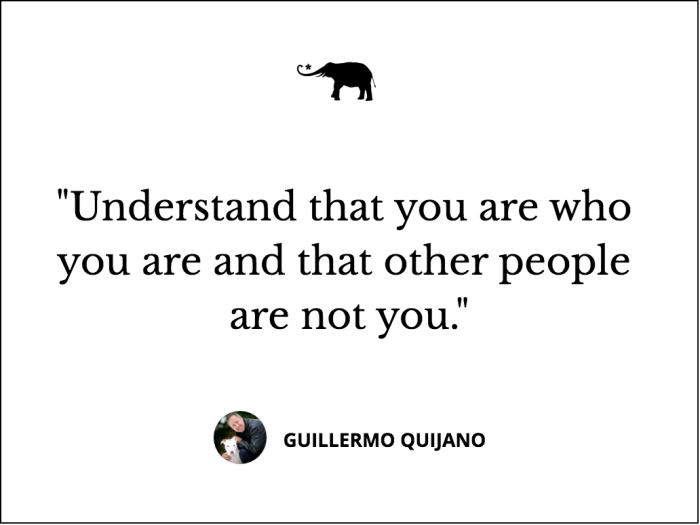It was right there all along! The answer to maneuvering through the minefield of love and relationships. So simple!
So I was telling someone about my latest heartbreak. I was going on and on about how my girlfriend was impatient and impulsive and reactionary, how she was critical and insensitive at times—even selfish and self-centered to a fault.
Somehow, the conversation was headed to a familiar place: me proclaiming that it was all her fault. But then, I caught myself being way too critical and thought to myself, “What if all of a sudden we try again and now my friends will look at me like I am an idiot for getting back together with a person whom I, just a few days ago, described as someone with such low moral fiber and terrible character traits?” Well, that would be embarrassing, wouldn’t it?
I switched gears. I quickly moved to saying, “Yeah, but…” and began listing all of the amazing things that made me feel alive about her—her kindness and caring behavior, her sex appeal, her passionate attraction toward me, the way she upgraded me and made me better in so many ways, the way I felt when she smiled and how I loved all of her rambling stories, the amazing intimacy between us, how sexy I found that she was independent and successful and had been a great mother, and how she kissed me when I came in the door. Seriously…I could go on.
But then my friend told me, “Just focus on her flaws and that will help you forget her quicker and move on.” You know what? For a second, that made total sense and it was actually working, but then, it hit me! This was my epiphany moment; the more I thought about her flaws, the more I realized I love her!
And here was my reasoning. Think about this:
None of us are bad people. I, for one, consider myself “a good guy,” and how is that? Well, I am attentive and caring and loving and respectful and reciprocal and loyal and honest; I really am all of those things. Let me add a few more: considerate, tolerant, patient, calm, thoughtful, and yet, it seems that all that just wasn’t enough, and my relationships ended abruptly and painfully.
Because beneath all of those beautiful qualities I just listed (qualities that anyone would kill for in a man, or a woman) was a flawed and difficult person—another human full of crapola, trauma, sh*t, skeletons, cobwebs, and bullsh*t.
My life has been full of errors, shortcomings, mistakes, complacency, and procrastination. I have been insensitive, deceiving at times, mean, angry, jealous, and other things that both of my ex-wives qualified as “intense.”
And somehow (knowing all of this about myself), I spent a lot of time “fixing them”—the arrogance! Suggesting ideas (okay, pushing ideas) of how they should go for it and quit their job to be happier, or do this or that to better themselves, or critiquing them for not following through or getting impatient and annoyed about their flaws without recognizing their limitations, or their mindset, or their fears, and how I was likely contributing to making things worse, even on occasion adding hurtful stabs by calling them “annoying” or having a holier-than-thou attitude about myself—what an asshole!
The thing is this: we are imperfect.
All of us, and we are more imperfect than we are perfect. We are insecure and tentative and afraid, but deep inside, we all want to be good but have a real hard time getting there—especially when life seems to keep raining sh*t on us constantly.
Considering all of that, ask yourself this question: who am I then to pass judgement when I have so many hurdles left to jump myself? Who am I to demand or expect that another person fits my “specifications” or else they are not worth the (supposed) honor of my participation? Who has made me the character police or the person who decides which qualities are acceptable in others?
Where does it say that people can’t get angry? Or jealous? Or feel vengeance or rage? These are feelings that we have been given innately to be used to protect ourselves, to release pressure to deal with situations. Why would we expect anyone not to use them—even if against us?
And once I realized all of this, I figured out relationships: it isn’t about “lists” of things we have to do or expect. We are not going to be better partners or people miraculously by reading an article about “minimum requirements for lasting relationships.” It isn’t about peaceful thoughts we read each morning that are not part of who we are and only help us momentarily.
It is about the whole—the whole is what we fall in love with.
It is the whole that we miss when we break up. It is the whole that makes us laugh together like best friends or yell at each other like worst enemies, but not understanding our flaws as qualities and as part of our core (not understanding “the whole”) is what makes us hurt each other and stop loving each other.
I will no longer find calm by thinking about the flaws of someone I once loved with all of my being and shared indescribable moments with and respected just so I can pretend to feel better. Those flaws should have been the part I learned to understand and accept so I could enjoy their qualities more and so I could really mean it when I said “I love you.”
I don’t remember or know of anyone (ever) signing a paper that said, “You will be perfect every day at all hours and in everything you do and you will always be above reproach,” because that is not possible, that is not fair or reasonable, because that wouldn’t make any sense.
So, let’s get over ourselves and our godlike opinion about who we think we are and start worrying more about the things we need to improve; let’s stop pointing fingers and passing blame.
If we are ever going to give our relationship a true second chance, regardless of what happened (of course, outside of things being abusive or truly harmful), regardless of who “seems” at fault, never say or promise that we, alone, will change, or even expect that one of us will change.
Instead, agree that we will do better to understand and accept each other’s whole, that we will strive to come to the middle, to negotiate with honesty, and learn to realize that it is that whole that will keep us together, not the insistence of a change that will never materialize.
Understand that we are who we are and that other people are not like us. That we think how we think, but it doesn’t mean that our way is the way or that it is even right—and let’s start to come to the middle even (and mostly) with our flaws until we find out that common ground is possible and that common ground creates a strong love.
True love is the whole.
~









Read 20 comments and reply